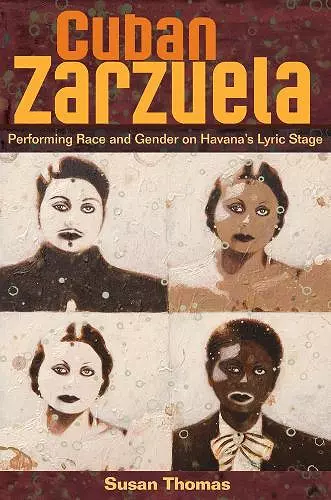Cuban Zarzuela
Performing Race and Gender on Havana's Lyric Stage
Format:Hardback
Publisher:University of Illinois Press
Published:11th Nov '08
Currently unavailable, and unfortunately no date known when it will be back

The dynamic genre of musical theater that transformed popular entertainment in Cuba
On September 29, 1927, Cuban soprano Rita Montaner walked onto the stage of Havana's Teatro Regina. The cross-dressed actress sang the premiere of Eliseo Grenet's tango-congo, "Ay Mamá Inés" and cemented the song as a classic in the Cuban repertoire. More importantly, her performance heralded the birth of the Cuban zarzuela, a Spanish-language light opera with spoken dialogue that originated in Spain but transformed popular entertainment in Cuba.
Susan Thomas's award-winning book offers the first comprehensive study of the Cuban zarzuela. Created by musicians and managers to meet a demand for family entertainment, the zarzuela revealed the emerging economic and cultural power of Cuba's white female bourgeoisie within the entertainment industry. Thomas explores zarzuela's function as a pedagogical tool that composers, librettists, and business managers hoped would control their troupes and audiences by presenting desirable and problematic images of both feminine and masculine identities. Focusing on character types such as the mulata, the negrito, and the ingénue, Thomas uncovers the zarzuela's richly textured relationship to social constructs of race, class, and especially gender.
Received the Robert M. Stevenson Award from the American Musicological Society (AMS), 2011. Received the Pauline Alderman Award for Outstanding Scholarship on Women in Music in the category of best book from the International Alliance for Women in Music, 2009.
"A fascinating interpretation and tightly focused look at the vernacular zarzuela ... as created in Cuba in the 1920s and 1930s."--The Bulletin of the Society for American Music
“Thomas provides both an informative treatment of this allegoric play and a well-written sociocultural discourse on the relationship between gender, race, music and dance in 19th-century Havana. . . . A useful volume for students of Cuban history (particularly as it pertains to women) as well as musicology and ethnomusicology.”--Choice
"No other author addresses the Cuban zarzuela in such a distinctive manner. Susan Thomas offers revelatory musical and cultural analyses in a captivating narrative replete with unexpected twists and illuminating conclusions. Her interviews with performers are invaluable to the historical record and her methodology provides a model for others to follow. What a powerful contribution to the fields of musicology, ethnomusicology, gender studies, theater studies, and Latin American studies!"--Janet Sturman, author of Zarzuela: Spanish Operetta, American Stage
"A commendable job of fusing analytical techniques from historical musicology with broader issues from women's studies, cultural studies, and other disciplines. No other work focuses on this material with such a critical eye, and no other draws such interesting parallels between distinct zarzuelas as Thomas."--Robin D. Moore, author of Music and Revolution: Cultural Change in Socialist Cuba
- Winner of <DIV>Received the Robert M. Stevenson Award from the American Musicological Society (AMS), 2011. Received the Pauline Alderman Award for Outstanding Scholarship on Women in Music in the category of best book from the International Alliance for Women 2009
ISBN: 9780252033315
Dimensions: 229mm x 152mm x 25mm
Weight: 540g
264 pages